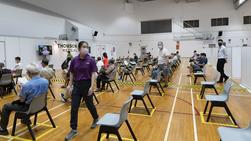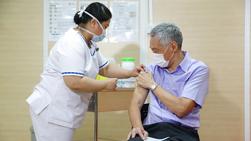 In this photo dated March 8, 2021, a health worker leads a senior citizen to an observation area after receiving the Pfizer-BioNTech COVID-19 vaccine at the Senja-Cashew Community Centre Vaccination Centre, operated by Thomson Medical, in Singapore. (PHOTO / BLOOMBERG)
In this photo dated March 8, 2021, a health worker leads a senior citizen to an observation area after receiving the Pfizer-BioNTech COVID-19 vaccine at the Senja-Cashew Community Centre Vaccination Centre, operated by Thomson Medical, in Singapore. (PHOTO / BLOOMBERG)
Singapore, widely praised for its handling of the pandemic, is once again a role model in the post-pandemic world: a high vaccination rate that makes "living with COVID-19" a reality.
The Southeast Asian city-state is now the world’s most vaccinated nation, as 80 percent of its roughly 5 million population are fully vaccinated thanks to government efficiency, people’s wide support and financial capability. Despite the presence of the highly infectious Delta SARS-CoV-2 variant, COVID-19 cases in the country remain relatively under control with only 121 new cases reported on Aug 30.
Singapore’s quest to boost – and accelerate the pace of – its vaccination is in line with its plan to drop the zero-case strategy and instead treat COVID-19 as an endemic, like flu or chicken pox, said analysts. This will allow Singaporeans to live and work as usual without having to go into quarantines and lockdowns.
Prime Minister Lee Hsien Loong reiterated this in his Aug 29 National Day Rally speech. Lee said the entry of the Delta variant in Singapore means “it is no longer possible to bring COVID-19 cases down to zero, even if we lock down for a long time”.
“Fortunately, with vaccination and added precautions, we can live with the virus and become ‘COVID resilient’, Lee said.
READ MORE: Singapore braces for a leap of faith in its COVID-19 strategy
Jeremy Lim, director of global health at the Saw Swee Hock School of Public Health at the National University of Singapore, said it is this “repeated and consistent messaging by political leaders and healthcare professionals” that has been crucial to Singapore’s success with vaccination. Lim said authorities have also been “rapid and decisive” in addressing any misinformation on vaccines.
Prime Minister Lee kicked off Singapore’s vaccination program by getting vaccinated in January. He then encouraged Singaporeans to get inoculated, saying that “it’s painless, it’s effective and it’s important”.
 In this photo released by Singapore's Ministry of Communications and Information, Singaporean Prime Minister Lee Hsien Loong, right, receives a vaccine for the coronavirus at Singapore General Hospital in Singapore Jan 8, 2021. (PHOTO / AP)
In this photo released by Singapore's Ministry of Communications and Information, Singaporean Prime Minister Lee Hsien Loong, right, receives a vaccine for the coronavirus at Singapore General Hospital in Singapore Jan 8, 2021. (PHOTO / AP)
In March, the Ministry for Communications and Information launched a full-pledged campaign to inform more people about vaccination. The campaign was delivered in various forms – from face to-face community outreach programs to social media platforms – so that it can reach out to as much people as possible.
Many MNCs (multinational corporations) use Singapore as their regional base. Their staff, both local and foreign, need to fly in and out of Singapore to visit operations in other countries. So too do our own businessmen. If our borders stay closed for too long, MNCs will find us less useful.
Lee Hsien Loong, Singaporean PM
Authorities have also opened up more community health centers and trained more vaccinators, making vaccines more accessible.
Paul Anantharajah Tambyah, president of the Asia Pacific Society of Clinical Microbiology and Infection, said Singapore’s wealth also accounts for its vaccination success.
“Singapore is a high income country with the financial resources to pay high prices for vaccines,” he said.
A major finance and trade center, Singapore is one of the world’s wealthiest countries with a per capita national income of $60,000.
Tambyah said Singapore is also a city-state, making it easy to distribute vaccines all over the country. This is in contrast to other countries with massive land areas and high rural population.
Lee said in his National Day Rally speech that with COVID-19 under control, it is time for Singapore to focus on generating “new growth, new jobs, and prosperity for the future”. And that future involves reopening borders to preserve Singapore’s status as a business hub.
“Many MNCs (multinational corporations) use Singapore as their regional base. Their staff, both local and foreign, need to fly in and out of Singapore to visit operations in other countries. So too do our own businessmen. If our borders stay closed for too long, MNCs will find us less useful,” he said.
Singapore is gradually opening its borders by allowing the entry of vaccinated travelers from Germany and Brunei starting from Sept 8. These travelers will no longer be quarantined and will instead be required to get polymerase chain reaction tests and go on a short period of self-isolation. Singapore will also lift restrictions for travelers from Macao and Hong Kong.
ALSO READ: Singapore conductor rides out pandemic with delivery job
Authorities have eased movement restrictions as more people get vaccinated. Employers can now bring more workers back to the office and more people, as long as they are fully-vaccinated, can attend events and enter public facilities like libraries and museums.
Sanjay Mathur, chief economist for Southeast Asia and India at Melbourne-based bank ANZ, said that Singapore managed to gradually reopen its economy because of its high vaccination rate and its capability to control the spread of the virus within its borders. He’s confident that Singapore will maintain its status as a “strong business hub” and has put GDP growth this year at 6.1 percent.
“Moving away from zero-case strategy should benefit Singapore as investors may finally manage to flock into the city,” said Alicia Garcia Herrero, chief economist for Asia Pacific at French investment bank Natixis.
But Garcia Herrero said that while Singapore’s high vaccination rate has allowed it to open its borders, the success of its ‘living with COVID’ policy will also depend on how its key trading partners like China are dealing with COVID-19.
“If China does not open up, Singapore will not be able to recover one of its most important sources of income, namely Chinese visitors,” she said.


